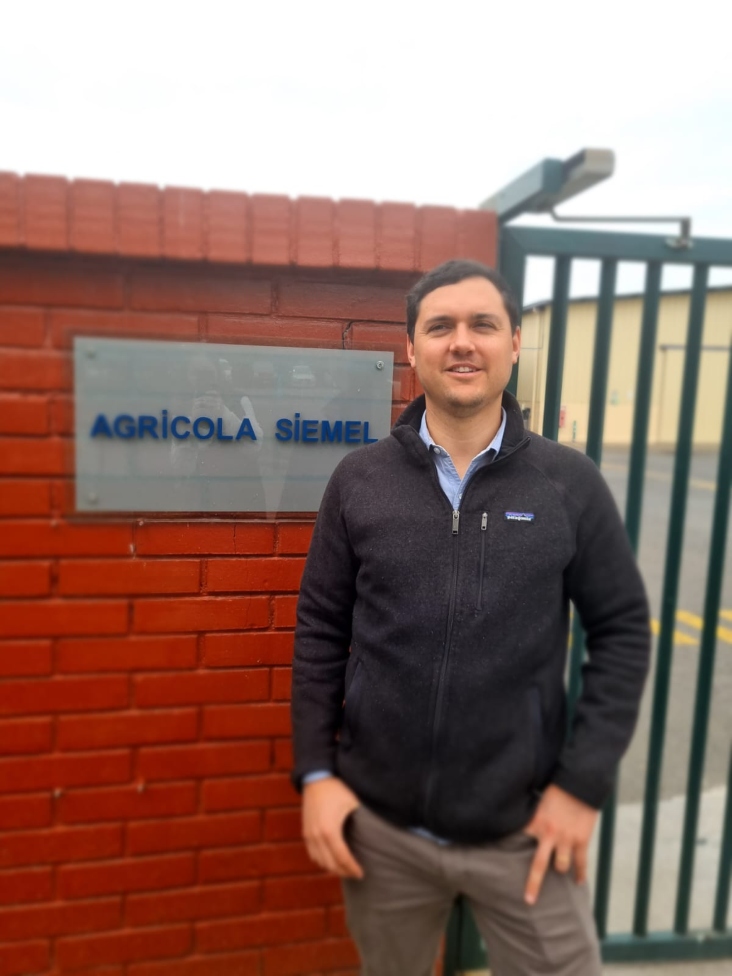After several years as business manager of Pacific Nuts and a short time in the enjoyable world of the beer in a company that was undergoing its internationalization process, José Tomás Quezada was asked to assume the general management of Agrícola Siemel.
He accepted and has been there since August.
Agrícola Siemel is not any company. It has more than 200 workers and belongs to Angelini Group. It has a fruit branch that is in Buin and other completely different branch in Aysen Region producing bovine and sheep meat, wool and sheep cheese.
In its agricultural branch it works in two farms, El Parrón and El Recurso; a total of approximately 500 hectares watered by Maipo River. They grow cherries, almonds and European plums. For the plums, the company has its own dehydration and processing plant which allows them to fully join the value chain so they develop internally the complete process of exportation. This model ensures quality control and efficiency in each stage, from production to international distribution.
The challenges that they face are diverse. Specifically, in the fruit area, the immediate tasks for 2025 include finishing planting the available surface in El Parrón farm; the last 30 hectares will be for cherries. When this stage is over, the work will be focused in the renewal of the fruit trees that have completed their productive cycle.
Regarding the plant, it has state of the art technology that enables them to process their plum production as well as other’s with efficiency and quality recognized by the international market with total control of the product. About 50% of the total business of Agrícola Siemel comes from the entire business of plums and prunes, their own or other’s.
“We export 2,800 tons of prunes and our drying plant has a capacity of 6,500 tons so we provide services to other exporters”, says José Tomás Quezada. He adds that they have 280 hectares planted with plums which is mainly meant for prunes while a lesser portion is meant for fresh fruit.
Strengthening a commercial path
The executive says that Siemel is in a growing and development stage reason why he was called to join in. The growth path can go in different ways: expand the crops with the fruit they already have, explore new ones or a mix of the above. He also considers the before mentioned renewal of some trees a new technology investments in the plant which will allow to reduce costs.
But what is completely clear is the strengthening of the commercial path.
In relation to exports, he says that the focus, for years, has been working with few customers, good in size, for a long time and in markets they feel secure. Among the important challenges the company has, now, one is to increase the number of customers inside countries, retailers, distributors, as well as the number of countries where the prunes are sent. “We want to expand and duplicate the good work done previously in relation to loyalty with big clients”, he adds.
For this purpose, during the following days he will travel to Europe to start a round of encounters with different customers. He will also go to SIAL-Paris 2024 one of the most important food fairs in the world which will take place between October 19th and 23rd.
“In my work career I have had the chance to make a very extensive and intense commercial work; this has been one of the main reasons why I came to Siemel. A good work had been done and we want to strengthen it. In this way we will appear in the map of the big global buyers, from Europe and Asia”.
Among them, China, he says, is undergoing a special moment as a very important market for our exports; China consumes plums and prunes and today without any doubt is the main destination of the national production.
“China, in many cases, is our best alternative, but it is also unpredictable in relation to its behavior in the future, especially in relation to the enormous plum plantations they are developing in their country. Facing this situation, there are two considerations: Chileprunes has done a very good job promoting Chilean prunes in a country with great projections like India that can be a good alternative in terms of diversification. Secondly, if China produces in big quantities, probably it will be competition in small calibers and we must watch out to get stronger in bigger calibers which is a product in which we are well evaluated”, says José Tomás Quezada.



